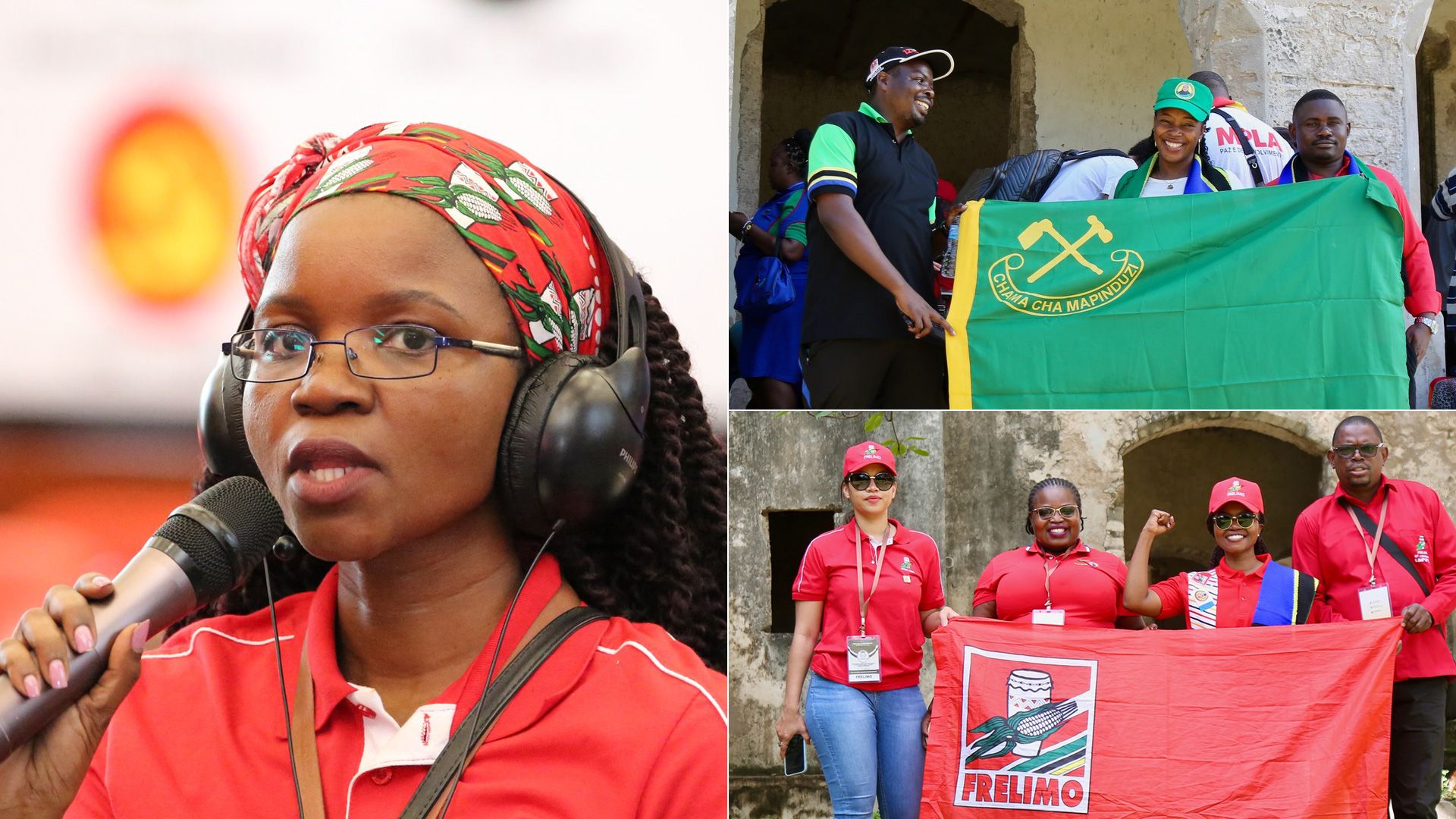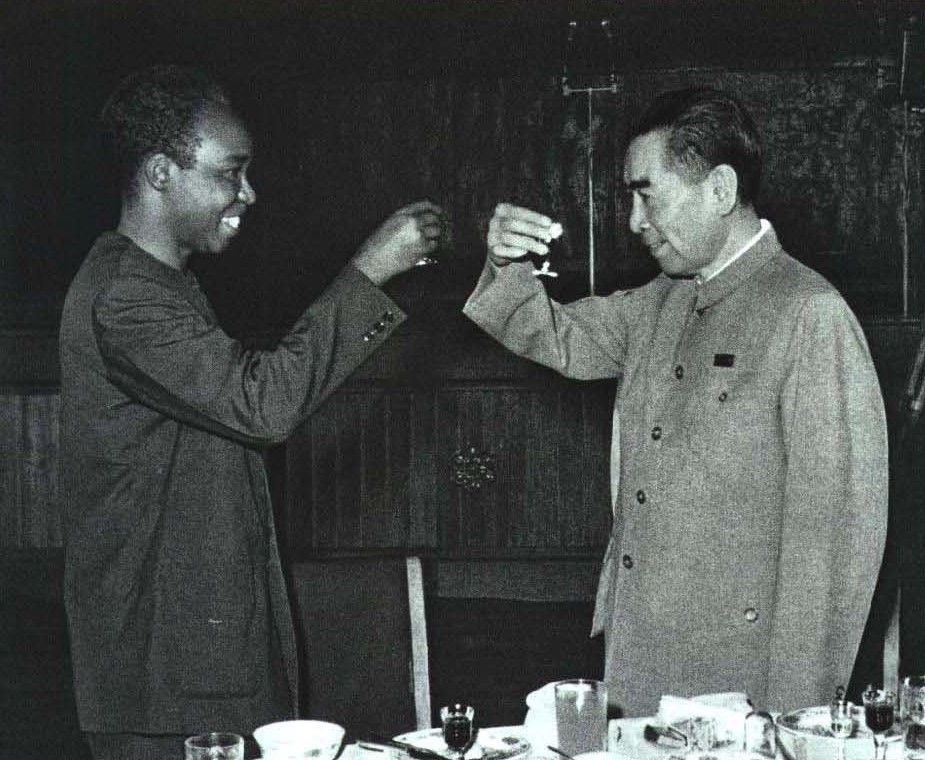| | | | | | | | | | | Axios China | | By Bethany Allen-Ebrahimian · Aug 20, 2023 | | Welcome to a special edition of Axios China. Today, we're highlighting my trip to Dar es Salaam, Tanzania, to visit a school where the Chinese Communist Party is teaching African ruling party officials its model of authoritarianism. - This story is Part 2 of our series China's Shadow Empire, a joint investigation between Axios and Danish newspaper Politiken, supported by the Pulitzer Center.
- Read the full version here, with maps, photos and embedded audio from our interviews. And listen to the "Axios Today" podcast episode about the story.
Smart Brevity count: 1,721 words, a 6½-minute read | | | | | | 1 big thing: Exclusive... In Tanzania, Beijing is running a training school for authoritarianism |  | | | Photo illustration: Sarah Grillo/Axios. Photos: Sebastian Kjeldtoft/Politiken and courtesy the Mwalimu Julius Nyerere Leadership School | | | | DAR ES SALAAM, Tanzania — The Chinese Communist Party is teaching African leaders its authoritarian alternative to democracy at its first overseas training school — the strongest evidence yet that Beijing is exporting its model of governing in its push to challenge the Western-led world order. Why it matters: The Mwalimu Julius Nyerere Leadership School in Tanzania is Beijing's counter to efforts by the U.S. and other Western countries to shape African politics in a fight for influence on the continent. - At the school, the Chinese Communist Party teaches how it fuses the ruling political party and the state, marking a clear departure from Beijing's previous, more subtle attempts to peddle influence on the international stage.
- Cultivating an authoritarian-friendly political bloc could help China reshape global institutions and guarantee markets as Western sanctions seek to isolate certain Chinese industries. Such a bloc would also help the CCP deflect criticism for its human rights record and gain international support for its core interests, such as its territorial claims in the South China Sea.
- Chinese and African government officials and Chinese state media have presented the school as a way to promote Africa's economic and social development, and they've cast the CCP's approach there as a way to alleviate poverty and spur economic development through training effective leaders.
But behind the school's closed doors, economics takes a back seat to political training. Chinese teachers sent from Beijing train African leaders that the ruling party should sit above the government and the courts and that fierce discipline within the party can ensure adherence to party ideology, Axios and Danish newspaper Politiken learned as the first Western news outlets to visit the school. - Through interviews with African officials who have participated in or observed the training, Axios and Politiken found evidence that the school's program contradicts CCP officials' repeated assertion — and many scholars' views — that Beijing isn't exporting its authoritarian model for governing.
- "There's been a reluctance from a lot of scholars to say that China is clearly trying to export authoritarianism," said Daniel Mattingly, an assistant professor of political science at Yale University whose research focuses on authoritarian politics in China. It's "remarkable," he said, that there are students who leave the school with the perception that "we need to move to a much stronger one-party state model."
|     | | | | | | 2. How it works: Educating ruling parties on cementing their control |  The Mwalimu Julius Nyerere Leadership School is a partnership between the ruling parties from Tanzania, Mozambique, Namibia, Angola, South Africa, Zimbabwe and the CCP. Map: Will Chase/Axios The CCP has held an exclusive grip on power for more than 70 years using a model Beijing is now trying to impart to ruling party officials from six African countries who also want to cement their control. - "[T]he most important part of that model is imbuing revolutionary parties with the idea that they are the permanent ruling party and educating them on how to achieve that aim," Richard McGregor, senior fellow for East Asia at the Lowy Institute in Australia, told Axios.
What's happening: The school, which opened last year, is a partnership between the CCP and the ruling parties of Tanzania, Mozambique, Namibia, Angola, South Africa and Zimbabwe. All six nations are multiparty democracies, but their governing parties share another key feature: Each has ruled continuously for decades. - China and these six countries have long had close ties, rooted in their parallel liberation movements. The CCP has for years invited delegations from African nations to attend training sessions in Beijing and in smaller cities around the country.
- But the scale and scope of the school and its location outside of China — a throwback to Beijing's Soviet-era strategies — mark a departure from what the CCP has previously done, experts said.
- The curriculum indicates the CCP is now "experimenting with exporting aspects of its model," McGregor said.
Details: Conferences and short course topics at the school are taught by Chinese teachers affiliated with party schools in China. In Tanzania, they teach party governance, party discipline, anti-corruption methods, Xi Jinping Thought, and poverty alleviation. African staff, who operate the school, give lectures and short courses on topics including Pan-Africanism, nationalism and public-sector enterprise management. Together, they share lessons from their revolutionary history. - The school, located on a large swath of land 30 miles outside of Dar es Salaam, was funded by a $40 million donation provided by the CCP's Central Party School, which trains China's top party officials. It was built by a Chinese construction company.
- Its campus is vast, complete with a large banquet hall, gyms, tennis courts and more than 300 hotel-style rooms with Chinese-made furniture. Like many projects in Tanzania, it's named after Mwalimu Julius Nyerere, Tanzania's first leader after it gained independence from Britain in the early 1960s. Nyerere is widely revered as the country's founding father.
- The first major training conference, for about 120 participants from all seven parties including the CCP, was held in 2022, and a second major conference with about 170 attendees was held in June this year. There have also been smaller conferences and short courses specifically for members of Tanzania's ruling party, Chama Cha Mapinduzi (CCM).
What they're saying: The Tanzanian principal of the school, Marcellina Mvula Chijoriga, declined to speak to Axios on the record during a visit to the school and declined Axios' request to observe training sessions and interview staff and participants. - "The [CCP] and political parties in Africa learn from each other on governance experience, and support each other's development path that suits respective national conditions. We don't seek to export our system," Liu Pengyu, spokesperson for the Chinese Embassy in Washington, D.C., told Axios in a statement.
- "The [CCP] is the central leading force of all endeavors and causes in China. It is the fundamental reason why the Chinese people and Chinese nation were able to transform their fate in modern times and achieve the great success we see today."
|     | | | | | | 3. What they're saying: "Wonderful lessons" |  | | | Left: A conference participant speaks during a training session. Right: Conference participants hold the flag of Tanzania's ruling party CCM (top) and the flag of Mozambique's ruling party FRELIMO (bottom). Photos courtesy of Mwalimu Julius Nyerere Leadership School | | | | The African ruling party officials Axios spoke with said they're enthusiastic about what the CCP is teaching at the school. - Collin Ngujapeua, an official in Namibia's ruling party, SWAPO, who attended the June training, said he hoped to implement several "wonderful lessons" taught by an instructor from the CCP's Central Party School, especially the fusion of party and government.
Though Namibia is a multiparty democracy, SWAPO has governed since the country won independence from South Africa in 1990. In recent years, SWAPO has made moves to grab more power, including pushing through its own appointees to lead the government's anti-corruption agency. - During the training, the CCP Central Party School instructor emphasized that party discipline should be above and outside the law, Ngujapeua said.
Between the lines: China's system features a corresponding party official for important government positions — provincial governor, mayor, university president and others throughout the entire system. The party position is superior to the government position, conveying party directives and guidance, which the corresponding government official then implements. - That type of system, originally developed by Soviet leader Vladimir Lenin and adopted by the CCP, translates into tighter party control over the state and eliminates checks and balances on the party's power. In China, the CCP's discipline commission has sweeping powers to detain, interrogate, investigate and even torture party members.
- Ngujapeua said it's "very important" for SWAPO to implement this style of party-state relations at the grassroots level. "We have to work hand in hand, the political party and the government." The instructor "told us we must solve our own problems. Instead of going to court, instead of using judiciaries … he said we must solve our own problems internally."
This style of party discipline can be appealing to ruling parties in Africa that have corrupt officials and "bad backdoor politics," Mandira Bagwandeen, a senior research fellow at the Nelson Mandela School of Public Governance at the University of Cape Town in South Africa, told Axios. - Among some African political parties, "there's a lot of admiration for the way the CCP is organized," she said.
- In China's model, African leaders see strong government leadership over a capitalist economic system as a way to break through stagnation, corruption and enduring poverty — and a road to greater global influence in a world still dominated by former colonial powers.
|     | | | | | | A message from Axios | | Your daily news in 10 minutes | | |  | | | | Hear the most important news and interesting stories with the Axios Today podcast. Host Niala Boodhoo fills you in on what you need to know each weekday morning. Listen for free in your favorite podcast app. | | | | | | 4. Zoom in: A fragile democracy at risk | | Members of ruling parties may admire China's model, but Tanzania's largest opposition party, Chadema, worries it would further weaken the country's fragile democracy. - Tanzania has a multiparty system on paper, but the ruling CCM party has managed to maintain its grip on power for decades — and in recent years, experimented with a more hardline authoritarianism.
What they're saying: China's governance model would hurt Tanzania, said Reginald Munisi, the director of strategies for Chadema. Opposition party rallies were banned for six years under the previous president, John Magufuli, whose hardline approach demonstrated that Tanzania's constitution and other legal rights protections weren't strong enough to prevent the country's slide away from democracy. - The CCP's claim that it shares the values of African liberation movements doesn't make sense, Munisi told Axios. "China is market-driven but very strict[ly] controlled when it comes to politics and individual liberty."
- "The liberation of an individual cannot just be economic. The liberation of an individual has to be complete: political, economic, and their social beliefs and thoughts" he said.
|     | | | | | | 5. Between the lines: How the U.S. trains political parties in Africa | | The CCP is also contending with Western democracies that have been exercising their own soft power on the continent for decades. The United States, Denmark, Germany and other countries have been training political parties across the region for decades, aiming to strengthen multiparty systems and political participation to bolster democracy there. Party training offered by democratic governments emphasizes leadership transition after elections. - Sentell Barnes, the resident program director in Tanzania for the International Republican Institute, a U.S. nonprofit funded by the U.S. government, told Axios that IRI's party training in Tanzania includes a focus on going from "winning to governing."
- This includes capacity-building courses on how to prepare for elections and how to handle peaceful transitions of power after elections — including how to accept an election loss.
|     | | | | | | 6. What to watch: The future of China's model in Africa | Julius Nyerere and Chinese Premier Zhou Enlai in 1968. Photo: Public DomainIt's unclear if and how far the ruling parties that received the training at the school will go in implementing China's model. Beijing's efforts to create a bloc of like-minded partners for long-term economic benefits and geopolitical influence have already seen dividends: China is the largest trading partner for numerous African nations and receives strong support from across the continent at the United Nations. - "What we see in Tanzania is about building something," McGregor told Axios. "It's a new era."
|     | | | | | | A message from Axios | | Your daily news in 10 minutes | | |  | | | | Hear the most important news and interesting stories with the Axios Today podcast. Host Niala Boodhoo fills you in on what you need to know each weekday morning. Listen for free in your favorite podcast app. | | | | A big thank you to Alison Snyder, Lauren-Whitney Gottbrath and Danielle Alberti for edits, Sheryl Miller for copy edits, Jacque Schrag and Will Chase for design and development, Sarah Grillo for illustrations, Aïda Amer for visuals, Jacob Knutsen and Han Chen for fact-checking, and Mwanamkasi Jumbe for reporting assistance. |  | | Are you a fan of this email format? Your essential communications — to staff, clients and other stakeholders — can have the same style. Axios HQ, a powerful platform, will help you do it. | | | | | | Axios thanks our partners for supporting our newsletters.
Sponsorship has no influence on editorial content. Axios, 3100 Clarendon Blvd, Arlington VA 22201 | | | You received this email because you signed up for newsletters from Axios.
To stop receiving this newsletter, unsubscribe or manage your email preferences. | | | Was this email forwarded to you?
Sign up now to get Axios in your inbox. | | | | Follow Axios on social media:    | | | | | |








0 Comments